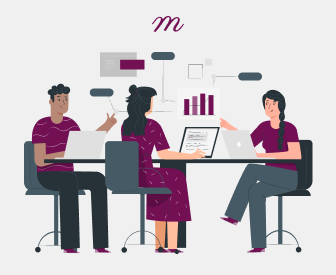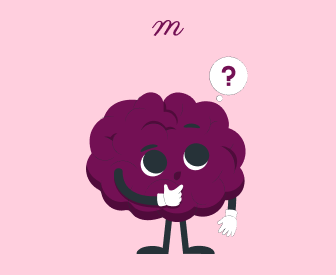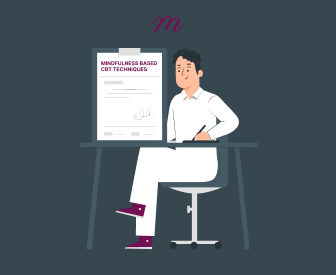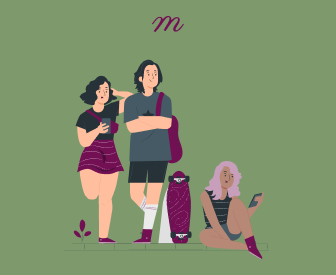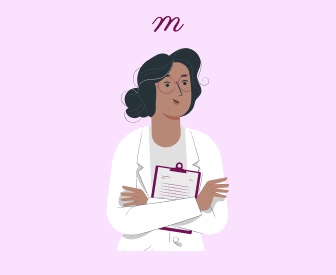Have your progress notes written for you automatically
Psychoeducational Group
As mental health professionals, we have a noble goal of helping our clients overcome their daily challenges. We are constantly exploring new and innovative ways to support them in their journey towards healing. Psychoeducational groups have emerged as a powerful tool in this regard. These groups aim to impart knowledge and build skills, making them an excellent choice for individuals with similar mental health problems or struggles in life. This article describes the transformative impact of psychoeducational groups in your therapy practice and how they offer a range of benefits to your clients.
What is Psychoeducation and Psychoeducational Group Therapy?
Psychoeducation is a method of educating individuals about their mental health conditions and available treatment options. Psychoeducational group therapy, led by a therapist, takes this approach further in an interactive and supportive group setting. This helps participants gain knowledge and better manage their symptoms. Unlike support groups, psychoeducational groups prioritize sharing coping strategies, wellness tools, and knowledge to gain a greater understanding of diagnoses and life challenges. It is a widely used tool for individual growth.
Psychoeducational groups helps people with conditions like:
Anxiety disorders: Discuss coping strategies, challenge negative thoughts, and relaxation techniques.
Chronic illnesses: Share diagnosis experiences, treatment options, lifestyle changes, and dealing with side effects or complications.
Addiction: Explore triggers, coping mechanisms, relapse prevention, and managing cravings. Build motivation and accountability.
The Benefits of Psychoeducational Groups
Participating in psychoeducational groups can offer numerous benefits to clients. First and foremost, these groups provide a safe space for individuals to connect with others facing similar challenges. By receiving positive peer support and feedback, clients can build their confidence and self-esteem and reduce feelings of isolation. These groups also provide a supportive environment for practicing social skills, which can be particularly beneficial for those struggling with social anxiety.
In addition to clients' benefits, psychoeducational groups allow therapists to provide valuable care to multiple clients with specific diagnoses or life challenges. These groups offer a platform to address common issues, such as anxiety, depression, or relationship problems, while also offering therapists the opportunity to learn and collaborate with other professionals. Co-leading psychoeducational groups can broaden therapists' knowledge and provide new insights into how clients interact, cope, and support one another. It can also enhance a therapist's ability to communicate and work effectively with other professionals, improving client outcomes.
Psychoeducational Group Topics
Psychoeducation groups are an excellent resource for people who want to learn more about a particular mental illness or life experience. With so many options available, there is something for everyone in psychoeducation groups.
Some examples of common psychoeducational group topics include:
Stress management
Teaching relaxation techniques, coping strategies, and lifestyle changes to better handle stress.
Healthy relationships
Helping people identify unhealthy relationship patterns, set boundaries, and build communication skills. Useful for those with codependency issues or a history of abuse.
Anxiety management
Providing education about anxiety disorders and teaching strategies like cognitive restructuring, exposure techniques, and mindfulness practices to alleviate anxiety and worry.
Depression management
Educating about the signs and symptoms of depression, treatment options like therapy and medication, and self-help tools for improving mood and motivation.
Grief and loss
Help members work through the grieving process in a supportive environment and discuss the stages of grief and how to cope with difficult emotions.
Parenting skills
Teaching positive parenting techniques, child development, behavior management strategies, and ways to strengthen the parent-child bond. Helpful for new parents or those struggling with parenting challenges.
Healthy communication
Improving listening skills, expressing feelings, resolving conflicts, and building closer connections through open and honest communication. Applicable for couples and families.
Providing Psychoeducation in Groups
Psychoeducational groups cover a wide range of subjects and offer a variety of topics that cater to everyone's needs. Here are five examples and ideas to help you get started:
Discuss Common Symptoms
Explain the symptoms of a specific mental health condition, like depression or anxiety. Discuss how symptoms can vary and encourage members to share their experiences. This helps reduce stigma and shows they are not alone.
Teach Coping Strategies
Teach simple coping strategies, like deep breathing, meditation, journaling, or exercise. Discuss how to apply them and have members share what has worked for them. Trying out new skills together boosts motivation and accountability.
Address Misconceptions
Provide factual information and address common myths about mental health. For example, explain that anxiety disorders are actual medical conditions, not character flaws. Offer clear facts warmly and compassionately.
Share Treatment Options
Discuss various treatment options, like therapy, medication, or lifestyle changes. Explain what they involve and their pros and cons, aiming to decrease fear of the unknown. Have members share their experiences with different treatments to provide realistic expectations.
Discuss Communication
Discuss how to communicate with loved ones about their mental health condition or treatment; for example, explain that setting boundaries and asking for their needs is okay. Role-play scenarios to build confidence as they develop new social skills. Sharing experiences helps validate their challenges and normalize discussions about mental health.
Understanding the Key Components of Successful Psychoeducational Groups
Structured curriculums for psychoeducational groups should focus on building practical life skills, management techniques, and coping strategies to ensure success. Interactive discussions and activities are critical components that reinforce learning. Worksheets, videos, and guest speakers can help participants understand and apply the material. This hands-on approach is practical in assisting participants to retain information and use it in real-life situations. Creating a comfortable and supportive environment is also crucial for the success of psychoeducational groups. Participants should feel open to sharing their experiences and asking questions, making sense of a community that encourages engagement.
Emphasizing the practical application of techniques is essential to ensure that participants can apply what they learn in the group to their daily lives. This can be done by giving homework assignments and following up on participants' progress. By doing this, participants can be assured that they are making progress and that the techniques they learn can be helpful in their daily lives.
How to Structure and Facilitate Psychoeducational Groups
As a facilitator of a psychoeducational group, your primary responsibility is to create a supportive environment where everyone can share their experiences and learn from one another. Effective leadership involves leading discussions, offering structured sessions, and providing evidence-based information. Encouraging active participation in discussions and activities can help clients benefit from peer networking within the group, leading to social learning. This can be a powerful tool to normalize clients' experiences and empower them to feel more connected to a community of like-minded individuals. As the group leader, focus discussions on how participants can apply their learning to their daily lives. Encourage them to try out new coping skills between sessions and report back on what worked. The more participants engage with and implement the material, the greater the benefits of psychoeducation group therapy.
To begin with, it's essential to clearly state the goals and objectives of the group and emphasize that the group's purpose is education and support, not therapy. Establishing ground rules for respect, confidentiality, and participation can help create a productive environment. An icebreaker can help members get comfortable at the start of each session. An introductory activity where people share their names, reasons for attending the group, and what they hope to gain can be a great way to start. Then, choose a client to cover critical points, allow time for sharing, set ground rules, and give homework.
Creating informative and engaging content is critical to successful psychoeducational group facilitation. A holistic approach can help clients achieve their goals and improve their overall quality of life. This can be achieved through interactive exercises, group discussions, and real-world examples reinforcing key concepts. It is also essential to make the learning experience memorable so that participants can recall and apply what they have learned outside of the group setting.
Present information in short segments using lectures, discussions, handouts, interactive exercises, and videos to ensure effective learning. Keep presentations brief, around 10-15 minutes at a time. Use open-ended questions to stimulate conversation and encourage participants to share coping strategies. Provide opportunities for people to connect through a partner or small group discussions and ask them to share how the information relates to their lives. Assign homework like reading handouts and practicing new skills.
At the end of each meeting, summarize key points, check for understanding, and preview what's to come at the next session. This gives members something concrete to work on until they meet again. Additionally, check in regularly with group members to ensure they find the meetings helpful and to adjust based on their feedback. Finally, review how people can apply their knowledge and answer any remaining questions.
Challenges and Considerations
When considering psychoeducational group therapy, several challenges and considerations need to be taken into account. These challenges could arise from resistance, cultural sensitivity, and adapting to change.
Dealing with Resistance
Creating a positive and supportive environment for all participants is paramount as a therapist leading a group therapy session. Remember that some individuals may feel hesitant or vulnerable, so addressing concerns and offering reassurance is crucial. Emphasize that group therapy is a confidential and safe space where everyone can freely share their thoughts and feelings. While you can't control what is shared outside the group, you have complete control over what is discussed. Therefore, listening carefully and promptly addressing negative comments or feedback is indispensable. By validating participants' concerns and working together to overcome any resistance, you can help everyone feel more comfortable and supported throughout the therapy process.
Cultural Sensitivity
When working with diverse groups, it is crucial to approach each participant with cultural sensitivity. Acknowledging and valuing cultural differences is fundamental to ensure that the therapy is inclusive and meaningful for everyone involved. You can achieve this by learning about the cultural nuances of each participant, using appropriate language and examples, and adapting the treatment to suit their needs. By doing so, you can create a safe and respectful environment that honors the cultural backgrounds of all participants.
Adapting to Change
It is essential to be adaptable when leading a group session. Considering the diverse needs and expectations of the participants, the therapy may need to be modified to ensure maximum effectiveness. As a therapist, it is vital to remain flexible and open to feedback and to be willing to adjust the session as required.
Overcoming Phobias: Facilitating a Successful Psychoeducational Group
In a psychoeducational group for phobias, you'll focus on educating members about their specific phobias and related anxiety disorders. You'll discuss the causes of phobias, symptoms people experience, and effective treatments. Members will learn techniques like relaxation, visualization, and cognitive restructuring to help them stay calmer in anxiety-provoking situations.
It would help to ask targeted questions to start a discussion and prompt exposure. For example, you might ask, "What thoughts go through your mind when you encounter your phobic object or situation?" This helps members identify irrational thoughts and replace them with more balanced ones. You can also ask, "What has stopped you from confronting your fear in the past?" Identifying obstacles will make overcoming them a group goal.
A crucial part of the group is sharing experiences with the phobia and what has helped different members cope daily. Hearing others discuss facing their fears in a supportive environment helps build confidence in one's ability to cope with anxiety and live life more fully. Members may even set small goals to confront their phobias gradually, with the group cheering them on.
Conclusion
By educating your clients about their mental health conditions and coping strategies in an interactive group setting, you can give them the knowledge and support system they need to manage their mental health better. This is a precious gift that you can offer to your clients. You get to facilitate engaging discussions on important topics, and your clients get to connect with others facing similar challenges. It's a win-win situation that can bring positive changes to their lives. If you haven't tried running a psychoeducational group yet, we highly recommend giving it a shot. You'll find it to be a rewarding experience for both yourself and your clients. And if you have any other questions, feel free to refer back to this post.
Stay ahead of the game and improve your practice with the latest AI tools. Try Mentalyc and enjoy the convenience of completing progress notes in as little as two minutes with our audio recording services and pre-designed templates. Sign up for our mailing list and be the first to know about new products and services (group therapy services are currently being developed) to make your life as a therapist more effective and stress-free.
We look forward to partnering with you!
Here are some of the most common questions and answers about psychoeducational groups:
What is the purpose of psychoeducational groups?
The goal of psychoeducational groups is to teach coping strategies and provide information about mental health issues and life challenges. Participants will learn from you and each other's experiences.
What is psychoeducational group therapy?
Psychoeducational group therapy is a type of group therapy that combines education about mental health conditions or substance abuse with therapeutic group activities. It focuses on providing information, support, and skill-building to the group participants.
Who benefits from psychoeducational groups?
Anyone dealing with mental health conditions, life transitions, or relationship issues may benefit from a group setting. These groups are beneficial for people with anxiety, depression, PTSD, OCD, phobias, and bipolar disorder.
What happens in a psychoeducational group?
The main objective of the program is to learn and develop skills. As the group leader, you provide information and encourage participant discussion. During the sessions, participants can share their experiences, ask questions, and try new strategies to deal with various topics. These topics may include managing symptoms, medication, improving relationships, parenting skills, and adopting a healthy lifestyle.
How long do psychoeducational groups last?
Groups typically meet weekly or biweekly for 6-12 sessions. Ome may continue longer or meet intermittently for follow-up. Shorter psychoeducational workshops are also common.
Do clients have to share personal details?
No. While some disclosure often happens naturally, the primary focus is on education. Your clients can share as little or as much as they feel comfortable.
How can your clients prepare for a psychoeducational group?
Before attending their first session, we recommend clients reflect on their goals and what they hope to achieve from the group. It can be helpful to have them jot down any questions that come to mind. It's important to let them know there is no pressure to do anything they aren't comfortable with, but being open to new experiences and willing to participate fully can make the experience more positive.
What should my clients expect from me as a psychoeducational group leader?
It is your job as the group leader to ensure the group runs smoothly and productively. Your clients should expect you to take the lead in structuring the group and ensuring meetings stay focused and on track. Moreover, you will ensure that all group members feel included and valued. Remember, a proficient group leader must maintain group guidelines and confidentiality. While allowing participants to lead discussions, you will provide them with support, feedback, and guidance.
What if my client is uncomfortable sharing in the group?
In group sessions, clients can choose how much or how little they want to share. Encouraging them to listen to others, ask questions, and participate in discussions at their own pace is necessary. As the group leader, ensuring that all participants respect each other's boundaries is essential. Over time, clients may feel more comfortable and build rapport with the group, leading to more open sharing, but there should never be any pressure. Simply listening can also be an incredibly insightful experience.
How does psychoeducational group therapy differ from other types of group therapy?
Psychoeducational group therapy differs from other types of group therapy in that it includes education and information about specific mental health conditions or substance abuse, as well as providing therapeutic support and activities.
What is the focus of psychoeducational group therapy in substance abuse treatment?
In substance abuse treatment, psychoeducational group therapy focuses on providing education about addiction, recovery processes, and developing healthy coping mechanisms to support abstinence and recovery.
How can psychoeducational group therapy help individuals with bipolar disorder or depressive symptoms?
Psychoeducational group therapy can help individuals with bipolar disorder or depressive symptoms by providing education, support, and tools for managing their condition, improving self-awareness, and developing healthy coping strategies.
What are the goals of psychoeducational group therapy for substance use disorder?
The goals of psychoeducational group therapy for substance use disorder include increasing awareness of substance use issues, developing coping skills to prevent relapse, and addressing underlying factors contributing to substance use.
How does psychoeducational group therapy contribute to the recovery process in substance abuse and mental health treatment?
Psychoeducational group therapy contributes to the recovery process by providing education, promoting self-awareness, and fostering a supportive environment for individuals to address their mental health or substance use concerns.
What are some common group activities in psychoeducational group therapy?
Common group activities in psychoeducational group therapy may include role-playing exercises, group discussions, problem-solving tasks, relaxation techniques, and cognitive-behavioral therapy (CBT) exercises.
How do psychoeducational group therapy sessions help in outpatient treatment settings?
In outpatient treatment settings, psychoeducational group therapy sessions help individuals by providing ongoing support, education, and skill-building while allowing them to maintain their daily routines and responsibilities outside of the therapy sessions.
Resources:
Anew Treatment Center. 2022, August 7). What Are Psychoeducational Groups?https://anewtreatmentcenter.com/psychoeducational-groups/
Belmont, J., & LPC. n.d.). Strategies for Running an Efflife's Psycho-Educational Group. Psych Central. https://psychcentral.com/pro/psychoeducation/2017/06/strategies-for-running-an-effective-psycho-educational-group#1
Karl, T. (2019, February 12). Ingredients for Effective Psychoeducation Group Rooms — Can You Add These In? 1 Learning. https://r1learning.com/blog/2019/2/12/7-ingredients-for-effective-psychoeducational-group-rooms-wmlwl
Sarkhel, S., Singh, O. P., & Arora, M. (2020, January 17). Clinical Practice Guidelines for Psychoeducation in Psychiatric Disorders General Principles of Psychoeducation. PubMed Central (PMC). https://www.ncbi.nlm.nih.gov/pmc/articles/PMC7001357/


